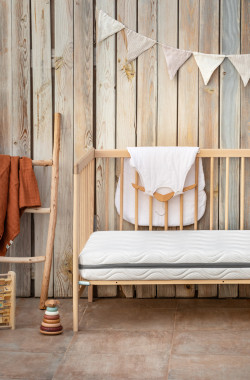
Why doesn’t baby sleep through the night? | Tips & Advice
In the first months of a baby’s life, lack of sleep is often difficult for parents to cope with. Infants need to eat every 4 hours or so, leaving little time for other activities, including sleeping!
While it is usual for babies not to sleep through the night in the first few weeks of life, it is abnormal for this to continue beyond 6 months. However, some children still don’t sleep through the night when they are 2 years old, so how can we help them to get to sleep?
Does your baby not want to go to sleep?
Help baby to differentiate between day and night
Your baby does not sleep through the night until he is 3 months old, but this is normal because he needs to eat regularly and does not yet know the difference between day and night. To help your child in this learning process, get into the habit, from birth, of making him sleep during the day without closing the blinds, so that he will associate darkness with night.
The same goes for noise, reserve silence for the night and continue to go about your business during the day even when your baby is asleep, he will understand that during the day there is life in the house and that at night everyone sleeps!
Establish a sleep ritual
If you dread the moment when you have to put your baby to sleep, your stress will be noticeable and communicative, which will delay your child’s falling asleep. Set up a ritual that will relax the whole family. Turn off all the screens and listen to soft music, dim the lights and light candles (out of the reach of children) so that the whole family can enjoy a cosy atmosphere.
Take advantage of this special moment to give your baby a bath, splashing around in the water soothes and tires the little ones and helps them fall asleep. After the bath, you can also massage your child with an oil to relieve tension.
After the bath, baby will have his last bottle of the day and you can then tell him a story or sing him a song before putting him to bed with his cuddly toy.
Teaching baby to fall asleep on his own and in his own bed
This is often the hardest part when baby is used to falling asleep somewhere other than in his bed, but if you let your child fall asleep in your arms or in your bed, he will be conditioned to always fall asleep that way! So get into the habit, from the very first days, of putting baby to sleep in his own bed and let him fall asleep on his own. He may cry for a few minutes, but this crying never lasts very long and after a few days, sometimes a few weeks, baby will fall asleep on his own in his bed!
Baby wakes up every night, how can I help him to sleep through the night?
Baby falls asleep without any problems but cries at night
The night, the darkness and the silence can sometimes be worrying for children.
Before the age of 6 months, baby can be woken up by hunger, this is normal. In this case, give him his bottle, burp him, change his nappy and put him back to bed. In the middle of the night, it is out of the question to spend time playing after the bottle, the night snack must be quick.
If a baby over 6 months cries in the middle of the night, he is not hungry, so he does not need a bottle, he just needs to be reassured. Soothe him by talking to him gently or by putting your hand on his tummy, but do not take him in your arms and do not put him in your bed!
Your baby cries at night, check that he is okay
Night-time crying can sometimes be linked to real discomfort that it is important to detect. While hunger is the main cause of night-time waking in toddlers, there are other reasons:
Baby’s tummy hurts, he may have a little burp stuck, take him in your arms and pat his back, in most cases after the burp, baby goes back to sleep without any problem.
Baby’s nappy is dirty, a dirty nappy on an irritated bottom can wake the child up, change the nappy, apply a cream if the skin is irritated and everything will be better!
Baby is too hot: the temperature in the room should not exceed 19 degrees. Touch your child’s hands, if they are hot, he is too hot! Find out. To check that baby is at the right temperature for sleeping, when he is lying in his sleeping bag, his body should be warm but his hands cold.
Baby has a toothache. Babies can have teething problems from the very first months. To identify them, simply observe his gums; if they are red and swollen, he is teething! To relieve it, ask your paediatrician for advice.














